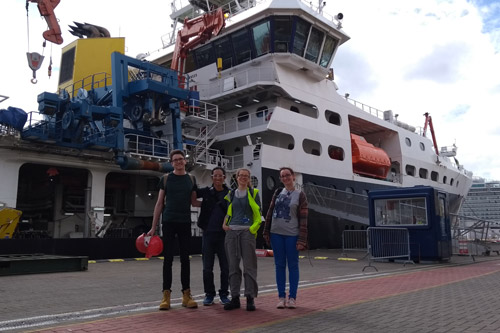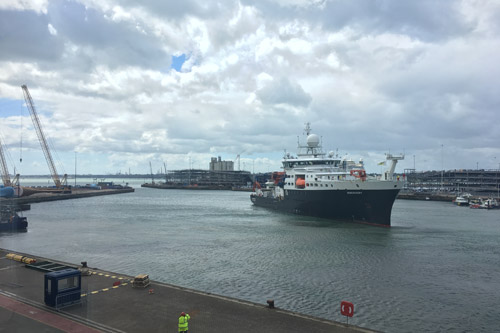One of the big unknowns about future supplies of nutrients to the oceans is the impact of melting glaciers and ice sheets.
Scientists from Bristol have already discovered that melting glaciers wash out a lot of nutrients and particles, that can later be a source of nutrients themselves, but no research has been carried out to determine to what extend these nutrients get into the sea.
The European Research Council-funded expedition on board the UK ship RSS Discovery will be the first to target these meltwaters and particles with the aim of identifying their physical and chemical fingerprint, determining their impact on marine life.
Dr Kate Hendry from the School of Earth Sciences and Cabot Institute at the University of Bristol, is leading the expedition.
She said: "The approach will be to capture the whole nutrient cycle system in areas of marked environmental change using careful field sampling strategies – with research expeditions to coastal Greenland and the open ocean Labrador Sea – together with cutting-edge analytical methods including an underwater robot."
The remotely operated vehicle (ROV) is piloted from the ship, and is able to pick up samples, take sediment cores and collect water samples, all with the help of real-time high-definition video.
During the expedition the team will be collecting samples from locations within the Labrador Sea in the North West Atlantic, including seamounts that are influenced by different oceanic currents, and the Greenland shelf.
They will collect samples of seawater, particles, sediments and biological specimens, all the way from surface waters to within the seafloor sediments.
The high-latitude regions are experiencing some of the most rapid changes observed in recent decades.
Polar temperatures are rising twice as fast as the global mean and there are concerns about the impact of sea-ice and glacier retreat on global oceans and climate.
The high-latitude North Atlantic is also a key region for ecologically and economically important natural resources such as fisheries. How these resources will change in the future depends strongly on the response of marine biogeochemical cycling of essential nutrients to increasing anthropogenic stress.
Diatoms are photosynthetic algae that are responsible for nearly half of the export of carbon from the sea surface to the seafloor, and they are a sensitive indication of the state of nutrient cycling.
Diatoms are one of many organisms that precipitate biogenic opal, an amorphous glass made of silica (hydrated SiO2) to form protective skeletons, and one of the essential nutrients is therefore dissolved silicon (Si) in the form of silicic acid.
The response of the silicon cycle to changing environmental conditions is critical for both carbon and nutrient cycling and it can now be addressed through high precision silicon isotopes, which is the focus of this project.
Dr Hendry added: "The results will lead to an unprecedented and cross-disciplinary view of nutrient cycling, biomineralisation, and the taxonomy and biogeography of siliceous organisms in an ecologically important region of the North Atlantic."
The expedition is led by the University of Bristol, but we will also have scientists on board from the Universities of Southampton, Oxford, Open University, and universities from the US as well as the National Oceanography Centre, British Antarctic Survey, and Huntsman Marine Centre in Canada.
The Discovery set sail from Southampton recently and the team will fly out to join the ship on July 5.

